New Upper School Courses Introduced for 2021-22 School Year
While most upper school students are finding their groove in the second semester and not at all thinking about next year’s curriculum, 2021-22 course selection is underway and there are seven new courses being offered to Friends Select upper school students.
These new courses include five from the History Department, like Global Environmental Politics and Work: Past, Present, and Future, both of which will be taught by Spring Greeney. Peter Sun will teach Race and Society, Brian Kors Music and Civil Rights, and Malik Mubashir African American History ll.
Global Environmental Politics will offer students an introduction to global environmental politics from an explicitly social sciences perspective (political science, history, sociology, economics). Spring Greeney, before becoming a teacher, helped write renewable energy policy for the Department of Energy. Establishing her goals for the class, Spring explains, “I hope students leave my class with a stronger sense of how environmental policy is made at a local, state, national, and international level. I also hope that they leave with some concrete ideas about how to influence the policymaking process at each of those scales.”
Work: Past, Present, and Future will introduce students to 20th-century U.S. history from an explicitly worker-centric perspective. In this class, students will answer questions such as, what should workers’ rights look like in the 21st century? How do we protect workers and encourage economic growth? Whose work counts? Excited to hear from students as she and they puzzle through this work together, Spring says, “I hope students leave my class appreciative of the gains won for workers today by past organizers. I also hope they leave more confident in their ability to speak with, write to, and ask questions of business leaders around the city.”
Race and Society, taught by Peter Sun, “rests on the central premise that our perceptions of race are inextricably intertwined with power dynamics in our society. Since our perceptions of race change over time, different groups in our society are in a constant struggle over power and access to power, and we can see how this plays out in our social institutions. The goals of the course are to dive into all this complex stuff, unpack and dissect real-world examples, and figure out meaningful strategies to create a more equitable world.” Peter emphasizes that “[his] hope is that students will leave class with the courage, conviction, and know-how to not only enter into hard conversations about race but to be agents of positive change.”
African American History ll, taught by Malik, will cover the history of Black people in America from around 1900 to the present. It is a new course: previously African American History was a single semester. Making African American History a full-year course, divided into two parts, allows students to slow down and take a deeper dive into this rich history, looking at many facets that simply could not be explored in depth in one semester. Malik says, “The course will serve as a “curriculum of correction” for Friends Select students and will help to restore this missing body of information. Whenever I am asked about the origins of this course, I have to point out that this course came into existence due to the activism of some of our amazing “sister-scholars” in the BSU, (Alloyah Abobi, class of ’19, Naeema Caldwell, Sofia Rodriguez-Burno, class of ’20) who campaigned to have a course on African American history offered at BSU.”
“Every American needs to know African American history,” Malik notes. “It will benefit any student who makes a serious study of the subject. I hope students will make many interesting and exciting discoveries that they never knew before … and that they will come away empowered by a deeper understanding of Black contributions to this nation and an appreciation of just how much work this country still has to do to achieve meaningful racial justice and equality.” Another interesting part of African American History ll is that taking part l is not a prerequisite for the class. Malik hopes that, “students will take the full year, and that we will have a good enrollment for both parts!”
Rounding out the new history curriculum is Brian Kors’ course, Music and Civil Rights. This class is a version of Brian’s History of Popular Music class with a special emphasis on popular music during periods of social unrest and change. He says, “With so much social action and unrest in the few years, it seemed a ripe time to look at the connection between music and Civil Rights movements.” Brian hopes, “[his] students will learn about the complex and powerful relationship between music and periods of momentum in our society and political system. [He is] also hoping that [his] students will learn interesting lessons on the history of the music business.”
The English department will add one new spring semester elective for the 2021-2022 school year, African American Literature, currently set to be taught by Miriam Rock. In this elective, students will read two novels, Nella Larsen’s Passing and Toni Morrison’s Beloved and excerpts from a variety of Black non-fiction writers including Martin Luther King Jr., Malcolm X, Bell Hooks, Michelle Alexander, James Baldwin, and Ta-Nehisi Coates. Miriam says, “Spending a semester reading books by Black authors helps students begin to explore the diversity and complexity of being Black in America. It also pairs really well with the two senior electives on African American History!” She also explains, “by centering Black experiences, the [English] department hopes to push back against the erasure of the Black community and to deepen students’ familiarity with African American Literature.” Miriam hopes “students will leave this class with a better understanding of the genre, a desire to read more books by Black writers, and an interest in taking courses on African American Literature in college.”
The last new class being offered next year, Advanced Digital Art, will be taught by Zoë Blatt in the Visual Arts department. This class is a continuation of Digital Art 1 and students will have the opportunity to dive deeper into subjects they learned in that class. Zoë says, “This course will allow students who have an interest in digital art to explore in more depth, expanding our current digital art offerings. We will explore film and animation and more advanced principles of photography, digital illustration, and 3D modeling. It will also help students who are thinking about studying any sort of digital art and design in college prepare works for their admissions portfolios.” Zoë “hopes that after taking this class, students feel confident using technology in different ways to create personal and meaningful works of art. [she hopes] they feel that the course offered them a space to explore their passions, experiment with new ideas, and better understand their own creative process.”
According to Chris Singler, new courses each year “are an opportunity for creativity, deep dives, and expanded interests for teachers. They also give students a breadth of opportunities.”
Course registration sign-up is due in Blackbaud on Friday, March 12 at 3:00 pm.









